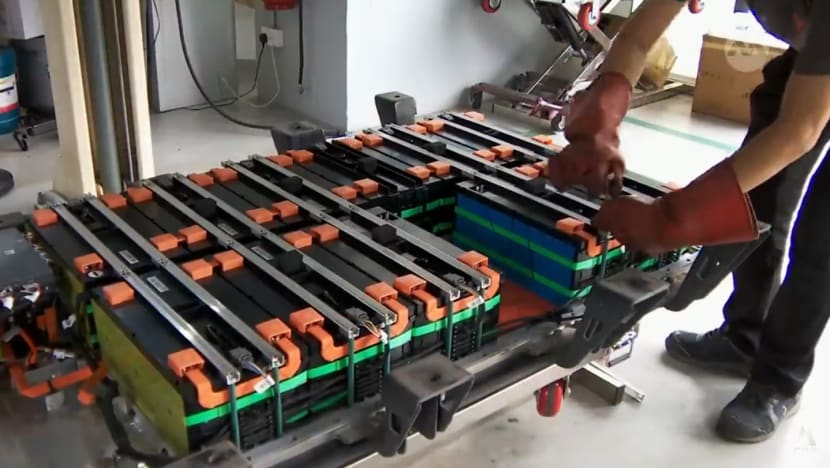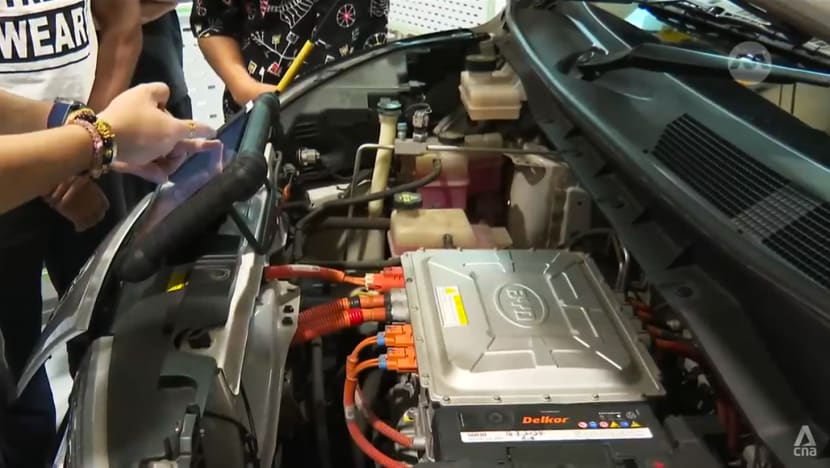Shortage of skilled mechanics a challenge as car workshops pivot to EV repair
To fill the gap, Temasek Polytechnic is offering courses to provide training in EV safety and knowhow.

A mechanic works on the batteries of an electric vehicle at a workshop in Singapore.

This audio is generated by an AI tool.
SINGAPORE: A lack of skilled personnel and the high cost of overseas training are some challenges faced by Singapore’s car workshops pivoting to electric vehicle (EV) repair.
Most auto workshops and mechanics currently cater to vehicles powered by internal combustion engines that use gasoline or diesel fuel.
But as Singapore drives EV adoption, workshops also need to accelerate to meet shifting demands as traditional automotives gradually phase out.
However, industry players say the transition has been tricky.
Hong Seh Workshop, for instance, faced a shortage of mechanics who could even understand the basics of EVs when the firm began to offer EV repair services seven years ago.
The company sent its mechanics to the factories of various EV brands for training but it was costly – sending 10 staff for one overseas upskilling trip set the company back by around S$45,000 (US$35,000).
The workshop’s executive director Edward Tan said the industry requires a lot of factory support from the manufacturers as the internal parts of EVs – such as the electronic control units – are proprietary to each carmaker.
This means mechanics need to be familiar with the unique systems of each brand before they can work on the cars.
“Our technicians and mechanics are taught by (each manufacturer) on how to service and repair, (on) safety protocols, how to link the vehicles back to the factories … for software updates and upgrades to the systems,” Mr Tan said.
The training paid off and today, Hong Seh is an authorised maintenance workshop for EV brands such as Riddara, Farizon, SRM, DFSK, Seres and Joylong.
LABOUR SHORTAGE
Singapore’s transition to EVs has been gradual, accounting for only 5 per cent of the total car population.
But numbers are expected to jump, with all new car and taxi registrations to be of cleaner-energy models from 2030.
Last year, 26,225 EV cars were registered, more than double that of 11,941 in 2023, according to the Land Transport Authority (LTA).

Despite the spike in EV takeups, workshops are hesitant to send their staff for training due to an ongoing manpower crunch.
Furthermore, as a majority of EVs are relatively new and still under warranty, most owners are likely to send their vehicles for repair in-house or at authorised workshops instead of third party ones, said Mr Joey Lim, president of the Singapore Motor Workshop Association (SMWA).
He added that EVs are still not a common sight at the motor repair workshops that the association represents.
Still, demand for technicians specialising in such vehicles is only set to rise as 2030 targets for the Singapore Green Plan approach.
RESKILLING TO WIDEN LABOUR POOL
Dr Kwan Kian Hoong, director of the Temasek SkillsFuture Academy at Temasek Polytechnic, noted that only around 10 per cent of mechanics in the nation have the skillsets to service EVs and hybrid vehicles.
To address the gap, the polytechnic is offering three courses covering topics such as EV safety, energy storage as well as various engine management systems to adult learners.
It has accepted more than 100 students since launching the first course last November, including mechanics, workshop owners and car owners.
"(We want) to train more professionals so that … there will be a competent pool of workers in Singapore able to service, maintain and educate car owners to embrace green technology,” said Dr Kwan.
The SMWA noted that while the current National EV Specialist Safety (NESS) certification programme, launched by the LTA to equip the workforce to handle EVs, provide a good foundation, they do not cover systems unique to each EV brand.
The association added that it is working with the tertiary institution as well as Chinese EV giant BYD and German automotive tech firm Bosch for targeted training for their employees.
BYD said it works with NTUC Learning Hub to conduct training courses like the NESS for technicians who maintain the Chinese manufacturer’s commercial vehicles.
Other carmakers like South Korean firm Hyundai said that Singapore's capable talent pool and upskilling efforts make the country well-prepared to deal with new EV technologies.
The firm produces four EV models at its Jurong facility, where local employees make up nearly 80 per cent of its around 300 workforce, according to the company.
Hyundai noted that Singapore is an attractive location for EV expansion due to its stable business landscape and commitment to sustainability.
Looking ahead, Dr Kwan said Temasek Polytechnic will create more “bite-sized” courses for repair professionals to study at their own pace.
“We hope (to) formally qualify them as a specialised professional (to) service … hybrid and electric vehicles,” he added.
















